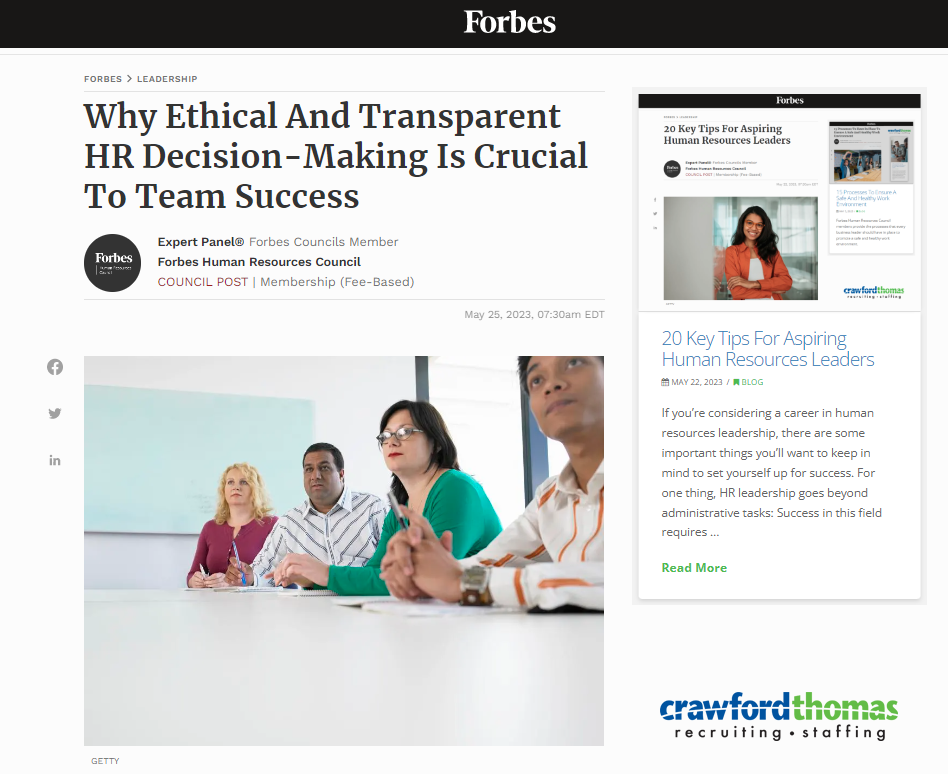Ethics and transparency in HR decision-making have become increasingly important for both companies and their teams. HR departments are no longer just responsible for administrative tasks; they now play a pivotal role in shaping company culture, fostering employee engagement and ensuring fairness.
By embracing ethical practices and maintaining transparency, organizations can build trust, attract and retain talented employees, foster collaboration within teams and ultimately drive overall company success. Below, 20 members of Forbes Human Resources Council explain why ethics and transparency are essential to HR decision-making.
1. They Optimize Value
When it comes to health benefits, ethics and transparency are paramount. Critical decisions— like what healthcare services to cover and how much cost to shift to members—are ideally made with a set of ethical guiding principles and communicated transparently to optimize healthcare value for employees and their dependents. – Ari Hoffman, Collective Health
2. They Improve The Company’s Reputation
A culture of ethics and transparency can improve the company’s reputation, including attracting stellar talent and ensuring customer and investor confidence. Furthermore, it creates a positive work environment, fosters trust and increases engagement among employees, which promotes the long-term success of the company and its teams. – Misha Ford, 3TG Staffing Solutions
3. They Ensure Legal Compliance
Ethical and transparent HR practices help ensure that a company is complying with legal requirements related to equal opportunity employment, anti-discrimination and other employment laws. It also contributes to a company’s reputation as a responsible and trustworthy employer. This can attract top talent and help the company build positive relationships with its stakeholders. – Tia Smith, Collaborative Solutions
4. They Contribute To Culture
An organization’s culture is defined based on trust within the teams and with their management. When HR makes a decision, it reflects on the management. Without transparency and ethics in the decision-making process, it breaks that trust with the employees. Even if the decisions are ethical, the perception of the employees may be different, hence, it is important to have transparency. – Srikant Chellappa, Engagedly | Mentoring Complete
5. They Create Safety
Ethics and transparency build trust. Trust is critical for lasting business relationships, and over time, ethical behaviors and transparent communication will build a climate of trust and safety. A safe environment is the necessary first step to allow individuals to bring their entire and best selves to work, which is rightly deserved by all. – Cynamon Voe Scott, DuploCloud Inc.
6. They Set The Organizational Tone
Human Resources sets the tone in an organization relative to ethics and transparency. It is the responsibility of HR to model how to ethically manage talent and judiciously share relevant information. The decision-making process should be based on ethical and transparent considerations, as well as the mission, vision and values of the organization. – Karen Hill, Otis College of Art and Design
7. They Are Paramount To Engagement
Ethics and transparency need to be demonstrated by all employees for team success and company success. HR is the steward of an organization. Ethics and transparency demonstrate values, expectations, the employee value proposition and the employer brand. Ethics and transparency are paramount, providing increased engagement, reduced employee relations situations and a positive company reputation. – Sherry Martin, Government Administration
8. Their Absence Can Compromise Ethics
If leadership does not trust HR, then there are many issues that will likely not be resolved. HR has to be the moral compass for the company and lead by example. If the company thinks that HR has compromised ethics, employees may act similarly, which can cause many problems internally and with customers. HR should be transparent to the extent possible so people know how decisions were made. – Erin ImHof, CertiK
9. They Lead To Sustainable Success
Ethics and transparency in HR decision-making are critical to the long-term success of a company and its team. Such decision-making promotes trust, respect and a positive workplace culture. It attracts top talent and avoids legal and reputational risks. Organizations should prioritize ethical and transparent HR decision-making to build a sustainable and successful business. – William Stonehouse, Crawford Thomas Recruiting
10. They Build Trust
Trust is at the core of the employee experience. HR has come a long way towards building that trust and moving away from the walk of shame. Ethical treatment of employees including honoring commitments to privacy. Transparency goes hand in hand with building trust. If you follow through with transparency, honesty and ethical modeling, you will earn trust and build team success. – Cat Colella-Graham
11. They Drive Company Success
Senior HR leaders are accountable for driving, not supporting, company success. They build an inclusive culture, reduce turnover, improve the employee experience and do what is right for the business. In the absence of ethical behavior and open communication, HR leaders will fail to build the trust with employees essential for executing. – Laci Loew, XpertHR (a division of LexisNexis)
12. They Support A Culture Of Fairness
Being transparent about decisions within your business fosters a culture of fairness and improves teamwork, productivity and innovation. The value of having different perspectives from all your employees, and really considering their opinions and ideas builds respect in the workplace and leads to lasting business success. – Laura Spawn, Virtual Vocations, Inc.
13. They Minimize Conflicts And Legal Risks
Ethics and transparency in decision-making are vital for success. They promote trust, accountability and fairness, leading to increased engagement, productivity and retention. Ethical and transparent practices minimize legal risks, reduce conflicts and ensure compliance, enhancing the company’s reputation. By prioritizing ethics, companies can build a positive work culture that drives success. – Joseph Soares, IBPROM Corp.
14. They Establish Clear Expectations
Ethical and transparent HR decisions ensure that both employer and employee expectations are accurately set and achieved. When companies are fair and transparent, they tend to be more successful—they drive higher employee engagement, foster stronger company culture and empower employees to communicate freely. This in turn makes employees feel more valued, leading to better business outcomes. – Kshitij Jain, Joveo
15. They Differentiate Your Company
Using ethics and transparency in the talent acquisition process will differentiate your company. It will help you to attract and engage with key talent by building trusting relationships quickly and giving a sneak peek into the company culture. These same ethics and transparency in the workplace will help with collaboration, open communication, employee engagement and retention. – Hazel Kassu, Sudduth Search
Visit Forbes Human Resource Council for the rest of this article: Original Article here.
Crawford Thomas Recruiting:

Crawford Thomas is a team of leading HR recruiters. We not only fill staffing needs, we partner with organizations to find out how their recruiting needs tie into their business objectives. Through this, we are able to meet your staffing needs in a way that achieves organizational success.
Start securing top talent by visiting our page for employers today.
Original Article here.

